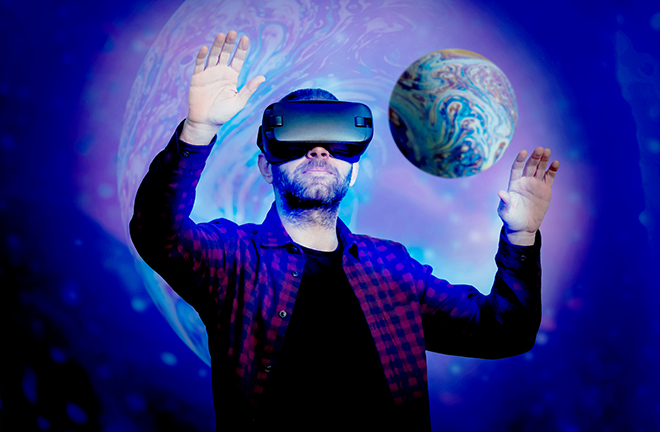Metaverse affects individual intellectual life

VR headsets are used to explore the metaverse. Photo: CFP
As the digitization and mediatization of society accelerates, the metaverse is gradually becoming a reality. Individuals in the mediatized era face issues never seen in traditional society, calling for the exploration of how individual mental well-being is affected.
Digital-mediatization
The era of the metaverse is characterized by a high degree of digital integration, as nearly every aspect of society is interconnected through digital media. Human-to-human and human-to-machine interaction are being replaced by interactions between humans and various types of software for information transmission and equipment control. Face-to-face communication is replaced by videoconferencing, while manual operation of machinery is supplanted by engineering software.
The possibility of converting information into a digital format serves as the precondition for mediatization. Various aspects of social life can be transformed into data according to specific standards for transmission, organization, and calculation. Human speech, thoughts, behavior, and even physical health and mental states can be digitized. In essence, the data generated by humans serves as “external subjects” that reflect their existence in the digital world.
Passive existence
The current era is one of acceleration, driven primarily by digitization. People rely less on books or face-to-face communication to understand the world around them. Instead, they turn to search engines, fragmented short videos, and short texts. Recommendation algorithms determine what information an average individual is exposed to, isolating people in filter bubbles.
This era is also an era of excess. Inundated with an overwhelming amount of information on a daily basis, people have little time for contemplation. The fast-paced nature of everything makes it difficult to keep up, let alone take the time to critically analyze the information received. Passive reception of information is replacing active introspection and reflection.
Digital-mediatization can lead people to passively pursue the ever-increasing pace of the world, and conform to the perceptions and goals imposed upon them. The emergence of “external subjects” means humans are gradually losing their raison d’être, and intelligent life becomes shallow and depleted.
Loneliness of individuals
The core crisis of the digital-mediatization era is manifested in the relationships between individuals and others, as well as within themselves. This era prioritizes homogeneity and efficiency while excluding anything heterogeneous, as if everything could be measured against a unified standard. Personality, habits, hobbies, and other forms of individuality are reduced to labels, alienating the uniqueness and richness of humanity to strings of data. Both humans and things are digitized amidst this wave, while most of the seemingly novel things are just collections of existing elements.
The homogenization of everything ultimately leads to a condition of loneliness unique to the present. On the one hand, as the heterogenous other is erased, and digital media is ill-suited to present true otherness, people are faced with homogeneous illusions. On the other hand, individuals are increasingly using avatars to represent themselves in video games, on social media platforms, and in other virtual environments, seeking to digitally embellish their persona. However, this pursuit merely redirects their narcissistic tendencies towards “external subjects.”
Concentrating on creating the fantasy of a beautiful self, people in cyberspace no longer genuinely care about others. When self-obsession replaces thinking, humans become lonely, narcissistic, and fragile individuals.
As individuals become disconnected from others, they also lose touch with their own sense of self. In the fast-paced era of digital-mediatization, it becomes increasingly challenging to pause and engage in genuine reflection and meaningful experiences. Independent and in-depth thinking, profound self-awareness, unique goals and aspirations are becoming rare, as even desires are easily satisfied by mass-produced digital commodities.
The problem is exacerbated with rapid advances in generative AI. Mass-produced digital content may replace creative interpersonal communication. People can easily satisfy their desires with AI-generated images and texts, thus losing the motivation for exploring the outside world. Communication with AI feels more comfortable than communication with real people because AI strives to respond to human requests. Isolated in cage-like media environments, people are left with simple gratification of desires and a sense of meaninglessness, emptiness, and nihility, gradually finding it hard to establish organic connections with their surroundings.
Prospect
It is not the intent of this article to predict a cyberpunk dystopia where humanity loses autonomy. The potential intellectual crisis in the era of digital-mediatization, just like the technological trends displayed by digital media itself, may hold promises for a brand-new future.
The metaverse is key to the future development of media. It is the culmination of various digital media developing together. Major media companies now share a common objective of developing the metaverse, but it is precisely the disorderly and uneven development of digital media that have resulted in the aforementioned problems.
To address these challenges, media should strive for open-source and open-ended development, allowing for public scrutiny and participation in the co-construction process. Instead of segmenting users to monopolize traffic and data, improving compatibility and uniformity is crucial to enable effective integration and interaction.
The metaverse should provide humanity with new possibilities for self-actualization, rather than serving as gilded cages for isolated individuals. A diverse, rich, and unified metaverse can only be built through joint efforts of all media and active participation from society as a whole.
Tian Ligeng and Zhang Yanxiang (associate professor) are from the School of Humanities and Social Sciences at the University of Science and Technology of China.
Edited by WANG YOURAN

 PRINT
PRINT CLOSE
CLOSE